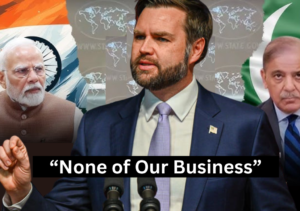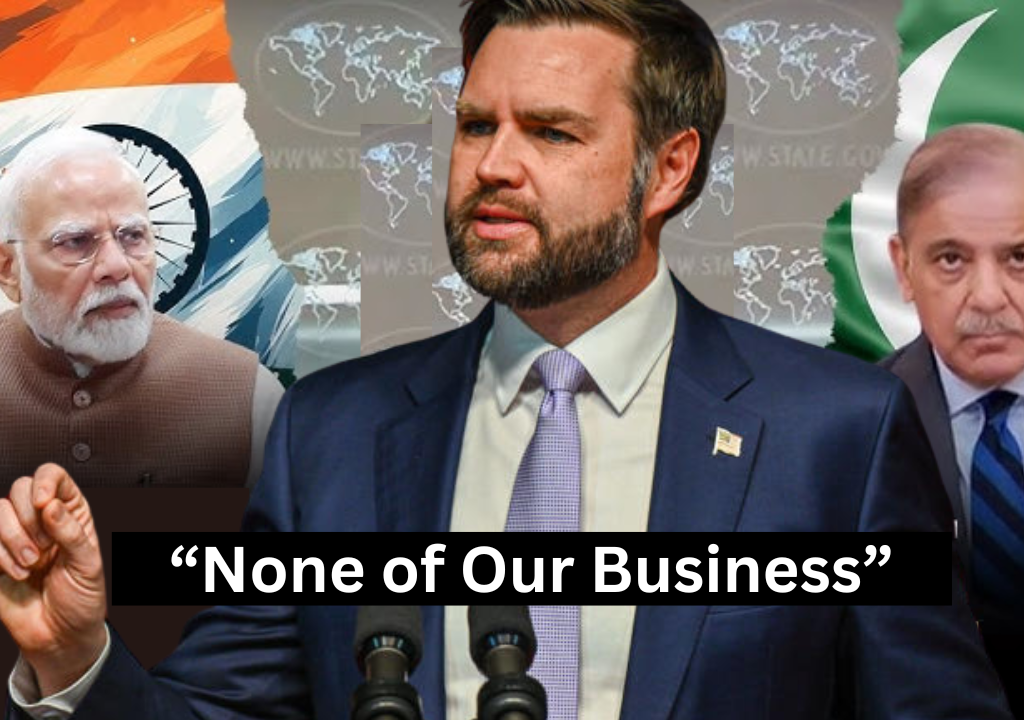In a sharp and strategic response to rising tensions between India and Pakistan, US Vice President JD Vance stated that the ongoing India-Pakistan conflict is fundamentally “none of our business.” His remarks came shortly after India’s retaliatory strikes under Operation Sindoor, launched in response to a deadly terror attack in Jammu and Kashmir’s Pahalgam region that claimed 26 lives. While the United States has long played a balancing role in South Asia, Vance made it clear that the Biden-Trump administration will not get involved militarily, opting instead for diplomatic channels to encourage both sides to de-escalate.
JD Vance: “We’re Not Getting Involved”
Speaking on Fox News, Vance emphasized that the United States has no interest in intervening militarily in the India-Pakistan conflict, describing the situation as a bilateral issue outside the scope of American national interest.
“We’re not going to get involved in the middle of a war that’s fundamentally none of our business and has nothing to do with America’s ability to control it,” Vance said. “We can’t tell the Indians to lay down their arms. We can’t tell the Pakistanis to lay down their arms.”
The Vice President’s stance reflects a growing trend in US foreign policy toward disengagement from international military conflicts unless core national security interests are at stake.

Failed Pakistani Strikes and Indian Air Defence Response
Vance’s remarks came just hours after Pakistan attempted to strike Indian military targets in Jammu, Pathankot, and other strategic zones. However, India’s air defence systems successfully intercepted and neutralized at least eight missiles launched by Pakistan, averting what could have been a wider escalation.
This failed attack followed India’s precision missile strikes as part of Operation Sindoor, which targeted nine terror hubs across Pakistan and Pakistan-occupied Kashmir (PoK). The Indian military action was a direct response to the April 22 terror attack in Pahalgam, widely believed to have been planned by Pakistan-based groups, including Jaish-e-Mohammed.
Trump’s Statement: Balanced But Cautious
US President Donald Trump also issued a public statement, calling for restraint from both sides and offering to mediate if needed.
“They have gone tit for tat… I want to see them stop and hopefully they can stop now,” Trump said. “If I can do anything to help, I will be there.”
Trump emphasized his friendly relations with both India and Pakistan, but avoided taking a firm position, suggesting that the White House prefers de-escalation through diplomacy rather than direct involvement.
Diplomatic Strategy Over Military Engagement
Both Trump and Vance’s remarks indicate that the US is choosing a non-interventionist approach to the India-Pakistan situation. While acknowledging the grave risks of escalation, including the possibility of nuclear confrontation, the administration is reluctant to take sides or assume an active role in peace enforcement.
“Our hope and our expectation is that this is not going to spiral into a broader regional war or, God forbid, a nuclear conflict,” Vance noted, adding that the US will continue to work through diplomatic avenues.
This marks a clear shift from previous administrations that often involved themselves in mediating India-Pakistan disputes, especially after major terror events like Kargil (1999) or Pulwama (2019).
India’s Stand: Firm Retaliation and Evidence-Based Diplomacy
Meanwhile, India continues to maintain its stance on zero tolerance for terrorism, reinforcing its right to self-defense under international law. The airstrikes conducted under Operation Sindoor were targeted, non-escalatory, and deliberately avoided Pakistani military facilities.
India has also ramped up its diplomatic offensive, sharing visual evidence of Pakistan’s military complicity with sanctioned terrorists, and briefing global allies on the nature and intent of its actions. The government’s messaging underscores that India does not seek war, but will not hesitate to defend its people.
Links Suggested: Digital India and Cyber Security: Balancing Innovation and Protection
Looking Ahead: De-escalation or More Retaliation?
While the US response—both from JD Vance and Donald Trump—may reassure global markets and international observers about the unlikelihood of a major war, India’s national mood remains firm. Public and political sentiment in India continues to demand accountability for Pakistan’s continued support for terrorism, and future responses may depend on how Islamabad reacts in the coming days.
The international community, including the United Nations and major powers like the UK, France, and Russia, are expected to call for peace while privately supporting India’s right to defend itself.
Conclusion
The India Pakistan Conflict US Reaction has been clear: the Biden-Trump administration will not engage militarily, preferring diplomatic dialogue to address the crisis. JD Vance’s remarks reflect a strategic withdrawal from global policing in favor of restrained, interest-based diplomacy. For India, however, the fight against terrorism remains existential, and Operation Sindoor marks a new phase in asserting its regional security doctrine. The coming days will reveal whether diplomacy can prevail—or if another provocation will push South Asia closer to conflict.

